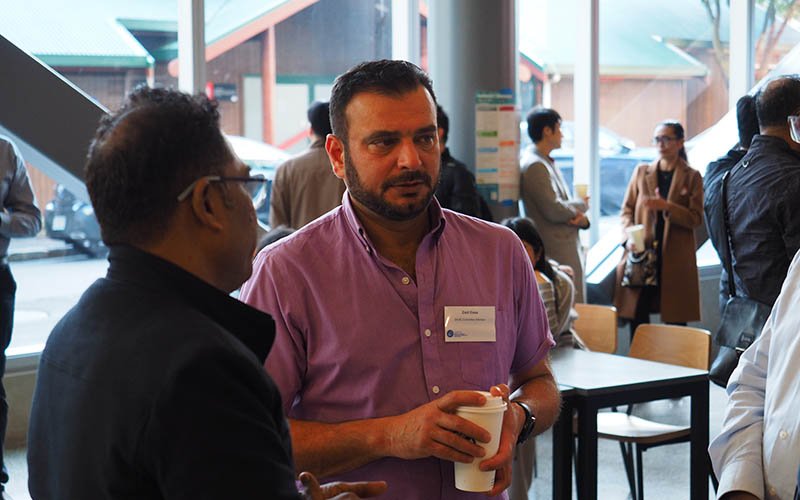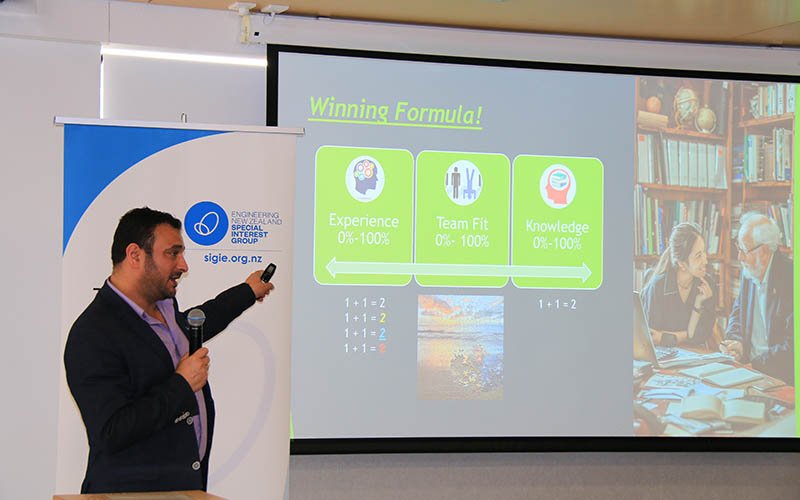6 Nov 2024
Engineers across Aotearoa are doing it tough, with a pipeline of projects that has all but dried up. Read about engineers’ experiences and what the work shortage has meant for them.
Zaid Essa chairs Engineering New Zealand Te Ao Rangahau’s Special Interest Group for Immigrant Engineers (SIGIE). Although he has many years’ experience managing infrastructure, transport and development projects he’s seen a huge turnaround in work available to engineers.
Zaid says changes became readily apparent with the arrival of new Government Policy Statements, which “changed the market dynamics.”
“Suddenly the building industry got a significant hit. Between March and September there was a pause, because there was money earmarked for infrastructure, but it was not being released… so we are still feeling that problem.” He says high interest rates didn’t help the problem especially in the private sector.

Zaid Essa at a SIGIE event. Image: Supplied
The situation contrasts 18 months ago, whereby Zaid said employers were actively recruiting Engineers and Construction experts after Cyclone Gabrielle. “The market was active, and the competition favoured job seekers. Employers were competing for quality and experienced professionals,” he says. “Now, there’s a vacuum of work.”
Although Zaid describes engineering as the “lucky industry”, where engineers often have transferable skills between disciplines, he says the vacuum has meant firms have had to let people go.
Compounding the challenges is the time it takes to procure projects. Zaid says, “My experience with any project worth $5m or more it that you’ll be looking at four to six months, just for procurement.” And for engineers currently out of work or facing redundancy, waiting for a tender to transpire may be a luxury they cannot afford.
Where roles become available, the demand is fierce. Zaid cautions that recruiters may look for any excuse to turn down applicants, so high quality job applications are essential. He knows of a project manager role advertised that received 1,000 applications, and another contract manager role that attracted 400 applications. But he also thinks recruiters can help lessen the impact of the current work shortage.
“I think recruiters can close that gap and find unique opportunities that are all over the place in New Zealand but not necessarily in the major cities,” says Zaid. He says 70 to 80 percent of the job market is hidden, and that often New Zealand’s many small to medium firms aren’t resourced to advertise their vacancies using job boards and the likes of Seek or Trade Me.
Zaid says migrant engineers find it even harder, often being told they don’t have the local experience for the job – even though they have all the required knowledge and compatible experiences. He says SIGIE helps to bridge that perceived experience gap by running webinars and training for migrant engineers to upskill themselves in local practice.

Zaid Essa presenting at a SIGIE event. Image: Supplied
All the same, Zaid says the difficulties faced by migrants are “double or triple” those faced by non-migrant engineers. These engineers become a flight risk – right when New Zealand is looking at a long-term skills shortage. He knows of migrant engineers who have wanted to stay in New Zealand but ultimately accepted offers in Australia. “She accepted that offer because of the potential and lack of opportunities. But that’s a good engineer that New Zealand has lost”.
And what are the risks of work having dried up? “Losing good people,” says Zaid. “There’s no way an organisation can recover such loss.” He says there may be other undesirable outcomes, such as “unhealthy competition driving lower pay.” Additional challenges could also be people getting stuck in jobs that don’t pay as well when the market picks up, which may result in lost productivity due to lack of motivation and mental stress.
What to do? Zaid knows the cycle isn’t permanent but believes things will remain tough until the first half of 2025. He says that at the moment engineers are in “survival mode”.
“It’s not a silver bullet, but we need to be looking after each other – and be courteous to those who are struggling.”
Find out more about the impact of the engineering work shortage.




